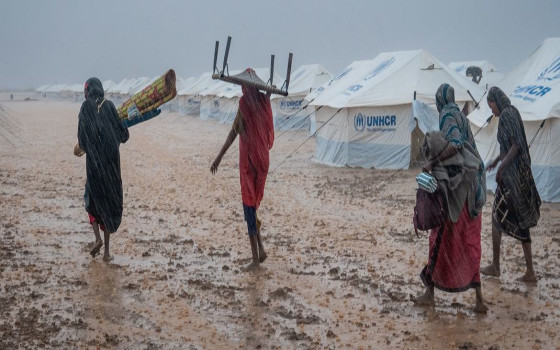
Sudan: The United Nations launches a humanitarian appeal for funding to confront the crisis.. Guterres: The country is being torn apart before our eyes and is now home to the largest displacement and famine crisis in the world

- Europe and Arabs
- Sunday , 16 February 2025 11:29 AM GMT
Sudan: The United Nations launches a humanitarian appeal for funding to confront the crisis.. Guterres: The country is being torn apart before our eyes and is now home to the largest displacement and famine crisis in the world
Khartoum - New York: Europe and the Arabs
The devastating war in Sudan is approaching its second year in April 2025, leaving a legacy of malnutrition, mass displacement of people and chronic insecurity.
As the United Nations prepares to launch a humanitarian appeal for record funding of $ 4.2 billion to support relief operations in the country, and the crisis in Sudan, which has been described as "the largest and most devastating humanitarian and protection crisis in the world today."
The lack of sufficient funds severely limits the ability of the United Nations to help the people of Sudan. The UNHCR and its partners have been able to provide less than the minimum support to refugees, and food rations have been significantly reduced, increasing food insecurity.
On 17 February 2025, that is tomorrow, Monday, the United Nations Office for the Coordination of Humanitarian Affairs and the High Commissioner for Refugees will launch an appeal for funding, based on their respective response plans for the crisis.
Sudan’s humanitarian needs have been estimated at $4.2 billion, a record high, with an additional $1.8 billion needed to support those hosting refugees in neighbouring countries.
While the amount requested may seem large, the Deputy Director of the United Nations Office for the Coordination of Humanitarian Affairs in Sudan stresses that given “what this can do for 21 million people in need of assistance, it is basically $200 per person per year. If we break it down further, the request is basically half a dollar per person per day.” According to the United Nations Daily News Bulletin
This comes after the Secretary-General of the United Nations, Antonio Guterres, said that the partnership between the African Union and the United Nations is stronger than ever. Before the African Union Summit, yesterday, Saturday, he spoke about the most important challenges facing the continent, touching on the situation in Sudan and the Democratic Republic of the Congo, the climate crisis and artificial intelligence. Guterres said the world should never forget that Africa is a victim of two enormous and complex injustices: the first is the profound impact of colonialism and the transatlantic slave trade. He noted that while colonialism has its roots in centuries, its bitter repercussions continue to affect Africans and people of African descent to this day.
He noted that decolonization, in itself, was not a panacea. It was time to develop frameworks for reparative justice, he said.
Secondly, the Secretary-General explained that Africa was under colonial domination when today’s multilateral system was created – and that injustice persists, noting that there is no excuse for Africa’s lack of permanent representation on the Security Council in the 21st century.
He said that correcting old injustices is essential to addressing current challenges, noting that he will continue to work with the African Union and all Member States to ensure that Africa has the representation it needs and the justice it deserves – including by granting it two permanent seats on the Security Council.
He also stressed the need to reform the global financial system, adding: “We will continue to push together for an international financial system that is no longer outdated, dysfunctional and unfair.”
Four areas for action
The Secretary-General noted that the continent is full of hope and potential. He highlighted four areas for action on the African continent: First, we must push for peace and security and alleviate the appalling levels of human suffering.
He said: “Sudan is being torn apart before our eyes – and is now home to the world’s largest displacement and famine crisis. As we approach the holy month of Ramadan, it is time for an immediate cessation of hostilities.” He called on the international community to unite to stop the flow of weapons and the financing of the bloodshed.
On the situation in the Democratic Republic of the Congo, the Secretary-General said that the raging fighting in South Kivu – the result of the ongoing M23 offensive – threatens to push the entire region into the abyss, stressing the need to avoid regional escalation at all costs. He stressed that there is no military solution.
Second, we must continue to work together to achieve the African Union’s Agenda 2063 and the 2030 Agenda for Sustainable Development – and push forward action on financing.
He said that African countries are paying about eight times what developed countries are borrowing. Twenty countries on the continent are in debt distress or at risk of it.
Thirdly, the climate crisis. Climate disasters are tearing Africa apart, destroying lives and economies and fueling conflicts, the Secretary-General said.
He said Africa has contributed little to the climate crisis, but is paying the price in the form of unprecedented droughts, floods and heat. He stressed that climate justice requires massive investment in adaptation, with the international community shouldering a huge responsibility.
Fourth and finally, the Secretary-General stressed that we need to take action on new technologies, including artificial intelligence, noting that nearly two-thirds of the African continent’s population does not have reliable access to the internet.
He said that we have a historic responsibility to ensure that artificial intelligence benefits humanity, not just a few privileged countries and companies.












No Comments Found